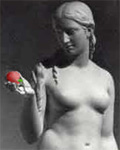Carolyn Moore’s
poems have garnered over sixty awards and honors, including the New Millennium Writing Award, The Foley Poetry Award, and the C. Hamilton Bailey Fellowship from Literary Arts, Inc. Her first collection won the 2005 New Eden Chapbook Award for spiritual poetry and two more chapbooks are forthcoming this year.
Among her journal credits are Nimrod, Bellevue Literary Review, and Crab Orchard Review.
After a lengthy teaching stint at Humboldt State University in Arcata, California, Moore now works as a freelance writer and copyeditor out of the last remnant of the family farm in Tigard, Oregon.
—Back to Extra Contents/Issue Links—
|
What the Apple Whispered
“. . . but Eve—Eve just wanted to know shit.”
—Tommy Gnosis in Hedwig and the Angry Inch
Knowledge is Trickster. Swallow if you will.
It makes no difference now—the bite was all.
Look down. Give nothing away. We are observed
and have little time. Yes, I’m the speech from where
sweet-tartness meets your tongue, yet I’m not your words.
Never mind the wonder of it—this
is what you bargained for: burden, truth.
Take a last look around you. Poverty
of imagination always stripped this place.
Only now can you see its nakedness.
Joy and pain—daughters and sons—will follow you.
Those who wield the intellect’s weakest knives
will whittle God down to a trifling size
that suits them: god in their own image. Life,
as you are soon to learn, is full of such
reversals. Split to one gender and stripped
of power, God will lose credit for pulse
in far-off gardens, lose the knack to craft
new beasts from old drafts. See how your serpent-guide’s
legs begin to wither? Some will call this
Punishment. Others will name it Sauropod.
Future tongues shall curse you for this taste
of knowledge. Future men shall chastise you
by sucking souls from your daughters for a time.
No matter what you’re called—Pandora, Eve,
Cassandra—you will never gain the trust
of fools. We’re done. We’ve cleared the bowels of truth.
You will forget the lessons this tree has shared—
except for one: compassion. Practice now—
stroke the lean beast hissing loss at your feet.
And before the flaming sword Forget can hack
the gate to bits, lick the juice at your lips.
Nothing will taste this powerful again.
A Deadly Sin and the Case for Baklava in the Afterlife
Include in mock-ups of Hereafter rolls
of flaky phyllo spiraling round chopped nuts.
Since eternal hunger craves variety,
invite pistachios with clear, low notes
to join the walnut choir. And don’t forget
contralto almonds can raise a joyful noise.
Let honey drizzle benediction. Let
its excess seep across floors that never turn
tacky with recrimination. Let
bees trace their jittery penumbras round
our heads. For surely all the good bees make
it to our afterlife, workers who toiled
on earth, their task made futile by our tricks
of plastic hive-walls vanishing once they’re filled.
By Afterlife, we don’t mean heaven. No.
Hereafter’s what we hear after—or don’t.
We mean a steady coil of Torah wrapped
around New Testament sweet ooze and nuts,
and a niche in honeyed cells, gray as late fog,
for those still singing when our voices yelp
in the stinging sheep-dip meant to purge from us
the sin of covetousness. We might hear bees
hum Hosanna! Minuscule tubes that serve
as insect hearts could swell with charity.
At the first whiff of holy baklava,
forgiving bees might rise above the buzz
of blame and thank us for our earthly theft.
|


